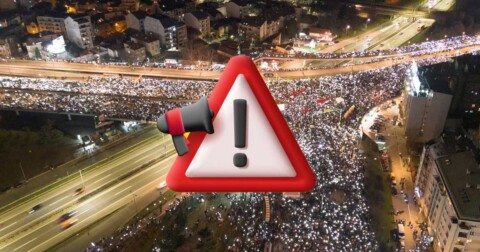Former Co-Minister of Internal Affairs in the transitional government formed after the October 5th overthrow in 2000, Božo Prelević, confirmed in an interview with N1 TV that he is one of the individuals with whom members of the organization named the Assembly in Exile are in contact. According to Prelević, the members of this organization are people from our diaspora who “gather to see whether they can help students and whether they can form expert groups that will one day help lift this tormented country from the ashes.”
THE VOICE OF THE DIASPORA FOR DEMOCRATIC CHANGE
At the beginning of February this year, N1 reported that “people from the Serbian diaspora launched an initiative to sign a declaration of support for students in Serbia, as well as the idea of founding an Assembly in Exile to further monitor the situation in our country” ([source]). At that time, members of this initiative, composed of Serbian expatriates in Western countries, informed the public that “almost all of them graduated from the Universities of Belgrade, Novi Sad, and Priština,” and had “proven themselves professionally while living abroad.” They emphasized that their knowledge and experience—as well as their love for their homeland—“can and must be one more source of pressure on the ruling regime, and a contribution to democratic changes in Serbia.”
The very first activity of these diaspora members clearly demonstrated the political goals around which the founders of this initiative have united. Namely, Serbian expatriates were offered the chance to participate in an online “symbolic” vote on four proposed points, as a form of joining the voice of the diaspora to the “general social pressure” aimed at showing “support for democratic efforts in Serbia” and influencing “public opinion and participants in political life.”
These four points were as follows:
- Support from the diaspora for the students and their demands;
- A declaration of no confidence in the ruling regime and the President of the Republic of Serbia;
- A demand for a time-limited government of independent experts tasked with stopping corruption and creating conditions for free and fair elections;
- A call to the EU and the USA to stop supporting the undemocratic regime ([source]).
FROM CROATO-LATIN PROGLAS TO SERBO-CYRILLIC ASSEMBLY IN EXILE
Numerous pieces of evidence suggest that the network of individuals gathered around the Assembly in Exile may have played a decisive role as external advisors in the decision by Students in Blockade to issue a demand for snap parliamentary elections and to form the so-called student electoral list. In this regard, the author of these lines received an offer to participate on the so-called student list on April 28, while the student blockers made such a political demand publicly only on May 5.
When it comes to influence over the student protest, the experts from the diaspora, united under the Assembly in Exile, have apparently taken on the role that was initially assigned to the pro-Western experts in Serbia associated with the ProGlas initiative. A careful observer would notice that the takeover of the coordinating role in the student protest—shifting from the Croato-Latin ProGlas to the Serbo-Cyrillic Assembly in Exile—coincided with a shift in the visual symbolism of the student protest, which, since the Sretenje protest in Kragujevac, has become strikingly national in character. Meanwhile, domestic “independent” experts from ProGlas were tactically moved into the second echelon of external coordinators and exploiters of protest energy—seemingly due to the premature exposure of their true political intentions and their subsequent failure to gain dominance over the student protest movement. In contrast, politically and party-wise “neutral” experts from the diaspora came to the forefront. It appears that ProGlas members have been assigned a new role in this phase: to shift from unsuccessful coordinators of the student protests to potential front-runners of the so-called student electoral list (though not all ProGlas members), or at least to act as public endorsers of such a list.
A JANUARY MESSAGE FROM THE FORMER RECTOR OF THE UNIVERSITY OF BELGRADE
The guiding principle behind all these activities by “independent” experts—whether they come from the ranks of ProGlas or the Assembly in Exile—is summed up in a January statement by Ivanka Popović, former rector of the University of Belgrade and a member of ProGlas:
“The students have done something tremendous—they’ve freed us from fear and given us hope. And now, the only decent thing is to say thank you for doing that; those who have the strength can stay, but we are taking over now.” ([source])
That the “independent” experts from both within the country and the diaspora are politically aligned is evident in Popović’s prompt support for the so-called student list and snap parliamentary elections on May 6 ([source])—even though she and other ProGlas members had previously advocated for a transitional government as the only acceptable political solution to the current social crisis.
If the experts from the diaspora, gathered around the Assembly in Exile, indeed play—as Božo Prelević claims, and as confirmed by the personal knowledge of the author of these lines—a key role in composing the so-called student electoral list, then it is of great importance that the public becomes familiar with the political and ideological positions of the initiators of this diaspora gathering. This is particularly important given that the political beliefs of the members of the Founding Committee of the Assembly in Exile remain largely unknown to the broader Serbian public—setting them apart in significant ways from the members of the ProGlas initiative.
OPPONENTS OF SOVEREIGNIST POLITICS
From the brief text outlining the mission and vision of the Assembly in Exile, little can be discerned about the political and ideological profile of its founders. The document consists of a series of easily digestible general statements envisioning Serbia as a law-based state with “functional and independent institutions,” “free media,” a society “where life governs politics, not the other way around,” where “social trust, understanding, dialogue, and tolerance prevail,” and which will, therefore, “serve as a model for all” . The founders of this initiative present themselves as people who “believe in democracy and the rule of law.” By invoking the meta-legal concept of the “rule of law”—a notion rooted in Anglo-Saxon political culture and different from the German concept of Rechtsstaat (legal state)—the founders ideologically position themselves as liberals. More can be inferred about their political stances from their announced areas of activity. Among other things, they state that they will focus on “applying pressure on the EU and the USA to support democratic forces in the country” and “providing legal assistance and advice to democratic forces in the country.” From this, it becomes clear that the initiators of the Assembly in Exile are firm advocates of a strictly Euro-Atlantic foreign policy orientation for Serbia, and that they oppose the politics of sovereignism, as they openly support the interference of the European Union and the United States in Serbia’s internal political affairs.

ENTHUSIASM OF A FORMER OTPOR MEMBER
Much more, however, can be learned about the political views of the key figures behind this Serbian diaspora initiative from their individual statements. According to information published on the initiative’s own website, the members of the Founding Committee of the Assembly in Exile are:
Jelena Ivić, Veljko Žižić, Lazar Džamić, Sanja Jović, Snežana Ćurčić, Dr. Jovana Diković, Dr. Miloš Stefanović, Dr. Aleksandar Novaković, Branko Milošević, Nikola Ilić, Dr. Aleksandra Zdravković, Radmila Stanojević-van Os, Branimir Mihajlović, Dr. Daniel Baloš, Sever Džigurski, Vladimir Radunović, Dr. Snežana Pejić, Dragana Đorđević, Danijela Đorđević, and Milan Nikolić. Notably, from the very beginning, they were given open media space on Radar, a portal owned by the pro-Western United Media.
In an interview with Radar ([source]), one of the committee members, Nikola Ilić—who lives in the United States and identifies professionally as a “leadership development expert, social entrepreneur, and activist”—said that he joined the initiative at the invitation of “my comrade” Veljko Žižić. Interestingly, Božo Prelević also mentions Žižić, a man from London, as his only contact with the Assembly in Exile in the previously referenced N1 interview.
Ilić, a professor of Democratic and Ethical Leadership at Georgetown University, expressed enthusiasm for his comrades in the Assembly in Exile—a sentiment that clearly reflects shared political and ideological views. He sees the struggle against Aleksandar Vučić as a continuation of the fight against Slobodan Milošević, which he began as a high school student. For Ilić, the key political problem in Serbia is a deeply rooted political culture that breeds autocracy and must be transformed after Vučić’s fall:
“We must ask ourselves: after everything Milošević and his crew put us through, how did we—as a society—once again choose an autocrat? Even if Vučić were to fall tomorrow, the people who elected him would still remain. The same patterns of thought, the same systemic weaknesses. If nothing changes in our culture and political consciousness, in ten or fifteen years we’ll have another Vučić.”
According to him, Serbia must change to such an extent that supporters of what he calls “autocracy” would never again be able to cross the electoral threshold. Achieving that, Ilić argues, requires profound “cultural changes.” There is no doubt that this founder of the Assembly in Exile looks to Western states and societies as the ideal model for how Serbia should be transformed.
THE IDEAL OF THE COLLECTIVE WEST
Nikola Ilić’s belief that Milošević was a dictator and that Serbia must undergo cultural transformation to prevent the re-establishment of “autocracy” is shared by political scientist Dr. Aleksandar Novaković from Switzerland. For him as well, the ideal is represented by the states of the Collective West, and in that context, he sees a special role for the diaspora in Serbia’s political life:
“If we want Serbia to become like the developed countries we live in, then the experience of living and working in such environments is invaluable for future reforms in the country.” ([source])
Stressing that he did not leave Serbia for financial reasons but because of a lack of democracy, Novaković openly rejects contemporary Russia as a model of governance in which he would never live under any circumstances:
“I would always choose a poorer life in an orderly and fair country over living in luxury in, say, Russia.”
That this founder of the Assembly in Exile is a pronounced Russophobe is clearly evident in his article Who Provoked Whom and Why – The War in Ukraine and the Redefinition of Realism ([source]). Novaković shares the view of well-known American neoconservative Robert Kagan, arguing that Russia was provoked in Ukraine not by an aggressive Western policy seeking to place NATO missiles on its borders, but by a “superior philosophy of life.”
In this context, Novaković quotes Kagan’s conclusion:
“Moscow failed to offer its neighbors any ideology, security, prosperity, or independence. It could only offer Russian nationalism and ambition, and it’s understandable that the peoples of Eastern Europe didn’t want to sacrifice themselves on that altar.”
“THE BEAST” IN THE FORM OF PUTIN
At the same time, Novaković claims that “Kagan may not be right when it comes to Russian soft power, which has spread quite successfully—and is still spreading—through the Western world.” On the other hand, Novaković agrees with Kagan that American indecisiveness in confronting Russia “produced a beast” in the form of Putin. This founder of the Assembly in Exile is a staunch supporter not only of liberal ideology but also of the necessity of American global hegemony (he compares the position of the U.S. in international relations to the position of the Sun in relation to other celestial bodies in the heliocentric system), as well as active U.S. involvement in European affairs—since only in this way can the position of liberalism as the sole global ideology be defended. Novaković criticizes Europeans for the compromising stance they took toward Putin in the past: “Let us recall Macron’s rather early proposal to help Putin save face, as well as Germany’s delaying tactics (until the very last moment) both in terms of implementing sanctions against Russia and in sending more serious weaponry to Ukraine.” He simultaneously praises the sabotage of Nord Stream, noting that “malicious tongues say that cutting Nord Stream was a serious warning to Europe to realign itself where it should.” As a proponent of the view that the West is “the most successful and attractive civilization in human history,” Novaković is an opponent of any kind of civilizational multipolar world order, even claiming that “irreconcilable lifestyles cannot cohabit in the long run, especially when there is clear superiority on one side.” As an opponent of multipolarism in foreign policy, Novaković classifies today’s Hungary and Serbia as “countries without productive aspirations.”

A SERB EURO-ATLANTICIST AND RADICAL LIBERTARIAN
In his article The Day After Regime Change, Aleksandar Novaković clearly defines his political and ideological stance as that of a Serb Euro-Atlanticist and radical libertarian, openly criticizing the entire current political elite in Serbia for their inconsistency in implementing a neoliberal political and economic model. Starting from the position that only Western-style conservatism is authentic, Novaković sees contemporary Serbian conservatism as “merely a byproduct of instinctive Russophilia and anti-Westernism—a juvenile reaction to the challenges brought by Serbia’s transition period.”
A particular target of this influential founder of the Assembly in Exile is the patriotic Serbian intelligentsia, whose advocacy of a “third way” (in Novaković’s words, “neither socialism nor capitalism”) he denounces as neo-Bolshevism. Thus, according to him, “Ković, as a ‘right-winger’ and ‘nationalist’, blames ‘anti-communism’ (sic!) for the sale of successful communist-era enterprises, the dismantling of the Yugoslav People’s Army and the security services.” As Novaković puts it, “everyone—both patriots and non-patriots—has one main target: neoliberalism. And yet, interestingly enough, Serbia is not even a neoliberal country.”
The foreign policy views of the Assembly in Exile’s founders are further illustrated by a tweet from cybersecurity expert Vladimir Radunović, in which he expresses support for anti-war activists in Saint Petersburg immediately following the launch of the Russian Special Military Operation.
BALLS IN THE VISE – BETWEEN DIGNITY AND SLAVERY
One of the probably financially most powerful members of the Founding Committee of the Assembly in Exile is former head of planning at Google’s European headquarters, Lazar Džamić (here). He is, by all indications, also one of the most fanatical Euro-unionists, “Second-Serbia” advocates, and anti-sovereignists among the initiators of this initiative. This is vividly illustrated by the following lines from Džamić, which—being paradigmatic—are quoted in extenso:
“When the regime goes, there will still be hooligans, paramilitaries, drug dealers, skulls and crossbones on flags, processions, conspiracy theories, corruption and the construction mafia, schemers and political turncoats, and swarms of ass-kissing flies in a panicked search for a new master, anti-Europeans, anti-gays, anti-feminists, anti-intellectuals, anti-modernists, isolationists, mythomaniacs, and war criminals. There will still be Kosovo, lithium, the terrifying debt of the country, three fingers, turbo-folk, arrogance, violence and pollution, unfriendly clerks and predatory enforcers, stubborn priests and, again, corruption… Our relationship with Europe is paradoxical. On the one hand, sovereignist foam comes out of our mouths every time someone ‘dares’ to ‘interfere in our internal affairs’; on the other, we want Europe to treat us like a colony and to actively take a side—to actually interfere in our internal affairs—by choosing whom they’d like to support as president or prime minister, and whom they wouldn’t.
They can’t do that, for many diplomatic and legal reasons—not even with Orbán, who is already in the EU, let alone with us. We want Laura Kövesi to prosecute the regime, but we don’t want EU flags at the protest; we want justice and equality, but we get angry at the only place that currently realistically offers that; we want institutions that work—the whole protest is about that!—but we don’t allow symbols of Europe at the protest, which are practically the only ones that still have such institutions—not perfect, not as they once were, but realistically better than anywhere else.
Even distant countries like Canada, New Zealand, and Australia (the CANZA bloc) are now moving closer to Europe.
As before in our history, many want something new—but for it to be like the old; many want change without change; belonging without a clear position; to sit on the kibitzfenster while the world around us falls apart.
Some want a choice without making a choice. Serbia cannot survive with dignity without Europe—everything else is slavery.” (source)
SERBIA AS A HOMELAND
Džamić does not hide his alienation from, and contempt toward, his own people: “The term ‘homeland’ is also in circulation, used to describe those remote, backward regions that exist in the darkness of social and spiritual poverty, mass media blackout, and nationalist myths—from which some of the most fervent supporters of the Serbian regime come.” Ecstatically calling on Serbs to make a choice—democracy versus authoritarianism; Europe versus nationalism—Džamić simultaneously warns students: “If we now turn the target of our anger and our historical sense of frustration, which the regime has been very effectively exploiting for decades to crush our spirit, toward Europe, then that’s yet another own goal that will show we, as a people, are simply incapable of thinking rationally, and that we will best defend our interests from within Europe. The modern geopolitical situation demands a very clear choice: America, Russia, China, or Europe. We can’t go it alone, and when we sit on too many chairs, it becomes ever clearer—our balls are caught in the vise.” (source)

THE HAGUE LIE OF KATARINA KOSTIĆ
An interview given by environmental expert Katarina Kostić to Radar (here) reveals that the devil is in the details when it comes to the political views of the founders of the Assembly in Exile. Namely, this owner of the company FROOF BIOTECH, who now lives in Spain, stated in the interview that she had long hesitated “whether to leave Serbia, where I had family, friends, and a good job. I finally left 20 years ago, when the official narrative began repeating that there was no genocide in Srebrenica—that’s when I made the decision. After that, I slowly built a new life in Barcelona.”
If the initiators of this Serbian diaspora gathering are, by their own admission, politically like-minded, then they also share Katarina Kostić’s Hague lie—that the Army of Republika Srpska committed genocide against Muslims in Srebrenica in 1995.
Even this brief review of the political positions of certain founders of the Assembly in Exile, which has unfortunately managed to exert significant influence over the student protest movement in Serbia, clearly demonstrates that the so-called student electoral list—being formed under the guidance of members of this diaspora initiative—will not reflect the majority political views of Serbian society. The views held by Serbian society on key political issues are diametrically opposed to those of these “concerned” experts from abroad.
UBI BENE, IBI PATRIA
Once again, it becomes evident that the inability of the Serbian state and domestic political actors to resolve internal conflicts on their own is being exploited by foreign powers to complete the process of Serbia’s full desovereignization and pacification, ultimately aiming at its total and final integration into the Euro-Atlantic community. Given the relative unwillingness of Serbs to accept an open foreign diktat, the Collective West has assigned a special role in this process to the Serbian diaspora. In this light, one should also evaluate the Assembly in Exile’s demand that members of the diaspora be granted voting rights in Serbia. The case of the Moldovan presidential elections clearly shows how such votes can be abused.
After all, representatives of the diaspora mostly view politics and international relations from the perspective of the countries in which they live. Their political judgment is also shaped by their professions, which often involve cooperation with the state administration and intelligence sectors of their resident countries. The current (mis)use of the Serbian diaspora in Serbia’s political processes is nothing new—it is simply a repetition, under altered circumstances, of what took place in the early 1990s. Being disconnected from the daily life of the homeland often leads individuals in the diaspora to form a distorted perception of political events. And what is, in the words of Carl Schmitt, the most important element in politics—the ability to recognize the enemy—is lost when one lives outside the homeland.
Therefore, political assessments of the situation in Serbia coming from the diaspora are not only often oversimplified and incomplete, but also false, because in those assessments, friends are mistaken for enemies, and enemies for friends—all according to the logic of the ancient maxim: ubi bene, ibi patria — where it is good, there is my homeland.





